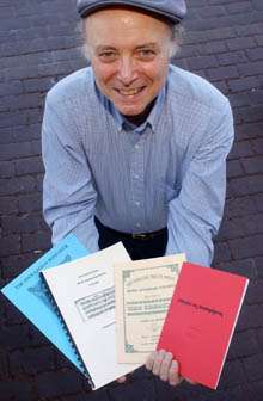
Saving local music
"My goal is to preserve early American music.
Our music history is being lost."
|
The Enterprise
Brockton, Massachusetts
April 11, 2002By Seth Owen, The Enterprise staff writer
Reprinted by permissionSTOUGHTON
While working in the local historical society in 1980, musicologist Roger Hall stumbled across a brown paper bag on the floor.
Hidden inside was a lost composition by Stoughton composer Edwin A. Jones.
"I was just flabbergasted," the 59-year-old Hall said, recalling the find.
The work was titled "Song of Our Savior."
Since making the discovery, Hall said, "I've tried to get it performed as much as possible."
Finding the lost work was sheer luck for Hall, who has spent the past 25 years researching music and fighting to preserve the work of Jones and other local composers. "My goal is to preserve early American music. Our music history is being lost," he said.
Hall has written booklets, produced videos and hosted cable shows on music of Stoughton and New England.
He has even chronicled the history of local music and placed it on microfilm that can be found at the Stoughton Public Library.Hall is particularly fascinated with Jones, a little known composer outside of Stoughton.
Most local residents probably know Jones as the man after whom a town elementary school is named. But Jones also had a distinguished musical career.
Born in 1853 in a large house at 9 Pearl St. across from Town Hall, he graduated from Stoughton High School at age 15, Hall pointed out.
Jones attended the New England Conservatory of Music and in 1876 graduated from Dartmouth College, where he served as president of his class, director of the choral group and played the organ.Jones returned to Stoughton after school and became a leader of the community, Hall notes.
The town seal was designed by Jones, who composed chamber music and had an orchestra that was "always involved in the town," Hall said.
After Jones died in 1911, his music was not played, Hall said.
With his longtime fascination with local music, Hall rattles off Jones' history without hesitation.
As he talked, a Jones composition played softly in the background on a CD.
Hall's interest in preserving early American music began when he was in college.
He grew up in Bloomfield, NJ, and started writing rock songs as an amateur in high school and later became a lyricist, writing the words to a rock 'n' roll song of the era called, "Sleep Walk."
Hall studied music at Rutgers University in New Jersey, where he received a degree in music composition and theory in 1970.
He received a master's degree in music from the State University in Binghamton, N.Y., studying ethnic music .
Hall did his thesis on the music of the religious group, the Shakers, who he said had "some beautiful music."
While working on a doctorate at Case-Western Reserve University in Cleveland, Hall continued his study of Shaker music.
He said the largest collection of Shaker music can be found at the Western Reserve Historical Society in Cleveland.
In 1976, Hall met up with an organist and the two recorded an album that included Shaker music and New England music.
Hall and his wife moved to Stoughton in 1977.
While looking for a house in the area, he was drawn to Stoughton because he was familiar with the Old Stoughton Musical Society.
Hall later became a member of the society, singing and serving as musical director and historian for a time.
For more about Roger Hall's music activities, go to
Center for American Music Preservation
Stoughton Music Heritage Series
© 2012 PineTree Productions. All Rights Reserved. Contact: pinetreepro@aol.com





